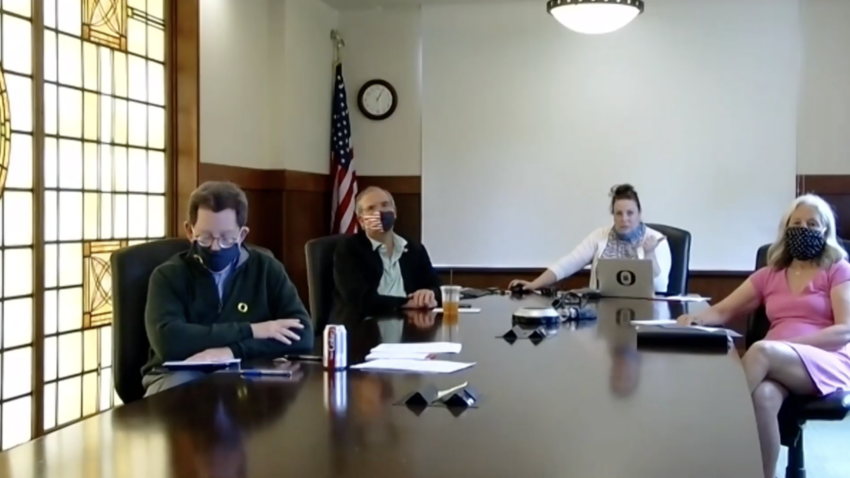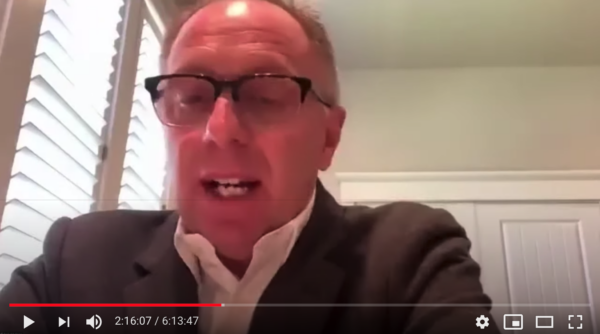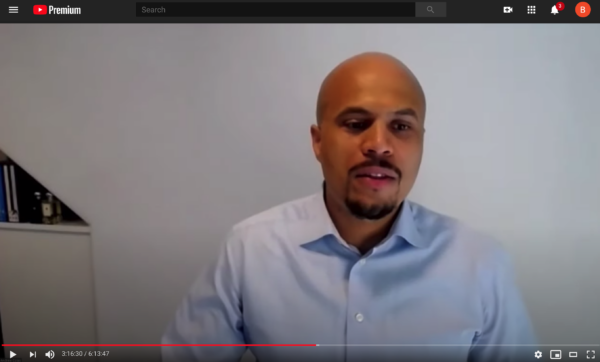Live-blog: Really not that hard, was it? I thought the student trustee Katharine Wishnia had the best comments, here. Pres Schill promised some stuff, and maybe called out implicit bias training as the sort of window-dressing we could do without, but I wasn’t really listening, sorry. If anyone brought up what to do about the Duck’s exploitation of mostly minority football players to pay for coaching, travel, and scholarships for mostly white non-revenue sport athletes I missed it.
Mostly this meeting is online – I mean virtual – but a few of the trustees are in JH:
One of them is wearing what appears to be an American flag mask. I’m no vexillologist who once got chewed out by my Boy Scout Troopmaster for wearing an American flag bandana on a canoe trip, but this is a violation of U.S. Code § 8. Respect for flag:
No disrespect should be shown to the flag of the United States of America; the flag should not be dipped to any person or thing. Regimental colors, State flags, and organization or institutional flags are to be dipped as a mark of honor.
(d)The flag should never be used as wearing apparel, bedding, or drapery.
(e)The flag should never be fastened, displayed, used, or stored in such a manner as to permit it to be easily torn, soiled, or damaged in any way.
(i)The flag should never be used for advertising purposes in any manner whatsoever. It should not be embroidered on such articles as cushions or handkerchiefs and the like, printed or otherwise impressed on paper napkins or boxes or anything that is designed for temporary use and discard. …
(j)No part of the flag should ever be used as a costume or athletic uniform.
Also, the flag should be displayed so that the union (i.e. the stars) are on the observer’s left.
6/24/2020: This is either going to be the shortest board meeting since the one where they bought out Gottfredson, or an opportunity for Pres Schill and our Trustees to give long, heartfelt speeches about their newly acquired but deeply held beliefs about the symbolic importance of de-naming Deady.
The next meeting of the Board of Trustees is scheduled for June 24 at 1:00 p.m. Pacific Time. This meeting will be limited to the topic of Deady Hall. The next regular, quarterly meeting of the Board is scheduled for September 10-11, 2020.
The June 24 meeting will be held remotely due to ongoing social distancing guidance. Members of the public or media may view a livestream feed at: https://youtu.be/diSuPRnX6Ko , or listen via audio only by dialing 1-888-337-0215 and entering Access Code: 9504541.
Those wishing to provide public comment to the Board for this meeting may do so in writing via trustees@uoregon.edu. All comments will be shared with trustees, but only comments received by 8:00 a.m. on June 24 are guaranteed to be shared with trustees prior to the meeting. Thank you for understanding.
6/10/2020: Pres Schill’s response to Trustee Colas ignores exploitation of black student athletes, accepts denaming Deady
Pres Schill’s letter is below – he says he’s changed his mind on denaming Deady and the Board will meet on it soon. He ignores the exploitation issue.
Trustee Andrew Colas, speaking at last weeks Board meeting:
First he pointed out to Duck AD Rob Mullens that it’s the football players – mostly black – whose unpaid labor earns 75% of the AD budget and supports Mullens and the “non-revenue” sports, which are mostly white. So Black Lives should Matter to Mullens, if he wants to keep getting paid. Video of Colas’s response to AD Rob Mullens is here:
Then, in thoughtful and moving remarks, he called for the Board to vote – immediately – to dename Deady Hall, here:
President Schill’s letter:


